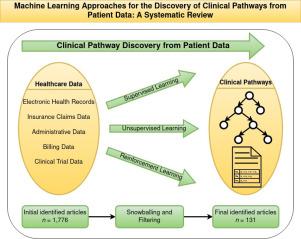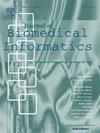从患者数据中发现临床路径的机器学习方法:系统综述。
IF 4
2区 医学
Q2 COMPUTER SCIENCE, INTERDISCIPLINARY APPLICATIONS
引用次数: 0
摘要
背景:临床路径是对一组符合预定标准的患者进行临床治疗时所遵循的事件序列。它们有很多应用,从医疗评估和优化到临床决策支持。这些路径可以从现有的医疗数据中发现,特别是通过机器学习,机器学习是从数据中学习模式的一系列方法。本综述全面概述了有关使用机器学习方法从患者数据中发现临床路径的文献:在系统综述和荟萃分析首选报告项目(PRISMA)方法的指导下,我们对现有文献进行了系统综述。我们检索了 6 个数据库,即 ACM Digital Library、ScienceDirect、Web of Science、PubMed、IEEE Xplore 和 Scopus,检索时间跨度为 2004 年 1 月至 2023 年 12 月,检索词与临床路径及其开发相关。随后,对检索到的论文进行了分析,以评估它们与本研究范围的相关性:共有 131 篇论文符合特定的纳入标准。这些论文表达了数据驱动临床路径发现背后的各种动机,从知识发现到与既定临床指南(来自现有文献和临床专家)的一致性检查。值得注意的是,采用的主要方法(67.2%,n=88)涉及无监督机器学习方法,如聚类和流程挖掘:结论:使用机器学习方法可以从患者数据中发现相关的临床路径,具有帮助医疗保健临床决策的理想潜力。然而,要实现这一目标,用于发现路径的方法应具有可重复性,并由临床专家进行严格的性能评估以进行验证。本文章由计算机程序翻译,如有差异,请以英文原文为准。

Machine learning approaches for the discovery of clinical pathways from patient data: A systematic review
Background:
Clinical pathways are sequences of events followed during the clinical care of a group of patients who meet pre-defined criteria. They have many applications ranging from healthcare evaluation and optimization to clinical decision support. These pathways can be discovered from existing healthcare data, in particular with machine learning which is a family of methods used to learn patterns from data. This review provides a comprehensive overview of the literature concerning the use of machine learning methods for clinical pathway discovery from patient data.
Methods:
Guided by the Preferred Reporting Items for Systematic Reviews and Meta-Analyses (PRISMA) method , we conducted a systematic review of the existing literature. We searched 6 databases, i.e., ACM Digital Library, ScienceDirect, Web of Science, PubMed, IEEE Xplore, and Scopus spanning from January 2004 to December 2023 using search terms pertinent to clinical pathways and their development. Subsequently, the retrieved papers were analyzed to assess their relevance to the scope of this study.
Results:
In total, 131 papers that met the specified inclusion criteria were identified. These papers expressed diverse motivations behind data-driven clinical pathway discovery ranging from knowledge discovery to conformance checking with established clinical guidelines (derived from existing literature and clinical experts). Notably, the predominant methods employed (67.2%, =88) involved unsupervised machine learning techniques, such as clustering and process mining.
Conclusions:
Relevant clinical pathways can be discovered from patient data using machine learning methods, with the desirable potential to aid clinical decision-making in healthcare. However, to reach this objective, the methods used to discover pathways should be reproducible, and rigorous performance evaluation by clinical experts needs to be conducted for validation.
求助全文
通过发布文献求助,成功后即可免费获取论文全文。
去求助
来源期刊

Journal of Biomedical Informatics
医学-计算机:跨学科应用
CiteScore
8.90
自引率
6.70%
发文量
243
审稿时长
32 days
期刊介绍:
The Journal of Biomedical Informatics reflects a commitment to high-quality original research papers, reviews, and commentaries in the area of biomedical informatics methodology. Although we publish articles motivated by applications in the biomedical sciences (for example, clinical medicine, health care, population health, and translational bioinformatics), the journal emphasizes reports of new methodologies and techniques that have general applicability and that form the basis for the evolving science of biomedical informatics. Articles on medical devices; evaluations of implemented systems (including clinical trials of information technologies); or papers that provide insight into a biological process, a specific disease, or treatment options would generally be more suitable for publication in other venues. Papers on applications of signal processing and image analysis are often more suitable for biomedical engineering journals or other informatics journals, although we do publish papers that emphasize the information management and knowledge representation/modeling issues that arise in the storage and use of biological signals and images. System descriptions are welcome if they illustrate and substantiate the underlying methodology that is the principal focus of the report and an effort is made to address the generalizability and/or range of application of that methodology. Note also that, given the international nature of JBI, papers that deal with specific languages other than English, or with country-specific health systems or approaches, are acceptable for JBI only if they offer generalizable lessons that are relevant to the broad JBI readership, regardless of their country, language, culture, or health system.
 求助内容:
求助内容: 应助结果提醒方式:
应助结果提醒方式:


